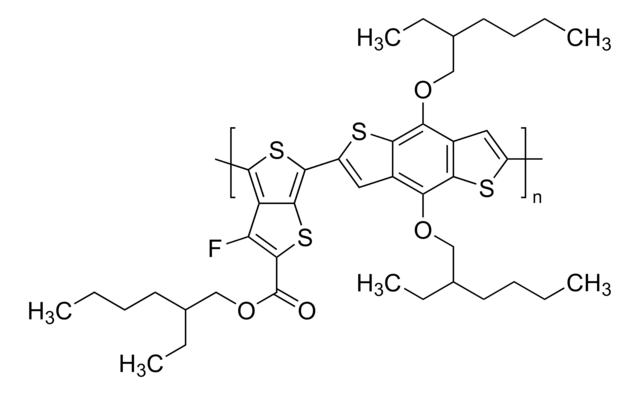684457
[6,6]-Phenyl C61 butyric acid methyl ester
>99.9%
Synonym(s):
1-[3-(Methoxycarbonyl)propyl]-1-phenyl-[6.6]C61, 3′H-Cyclopropa[1,9] [5,6]fullerene-C60-Ih-3′-butanoic acid 3′-phenyl methyl ester, PCBM, [60]PCBM
About This Item
Recommended Products
description
functionalized fullerene
Quality Level
Assay
>99.9%
form
solid
solubility
chlorobenzene: soluble
organic solvents: soluble
toluene: soluble
Orbital energy
HOMO 6.1 eV
LUMO 3.7 eV
semiconductor properties
N-type (mobility=0.21 cm2/V·s)
SMILES string
COC(=O)CCCC2(c1ccccc1)[C]3=4c5c6c7c8c9c%10c(c%11c%12c3c%13c5c%14c%15c6c%16c7c%17c9c%18c%19c%10c%20c%11c%21c%12c%22c%13c%23c%14c%24c%15c%25c%16c%26c%17c%18c%27c%28c%19c%20c%29c%21c%30c%22c%23c%31c%24c%32c%25c%26c%27c%33c%28c%29c%30c%31c%32%33)[C]2=48
InChI
1S/C72H14O2/c1-74-11(73)8-5-9-70(10-6-3-2-4-7-10)71-66-59-52-40-32-23-14-12-13-15-18(14)27-34(32)42-43-35(27)33-24(15)26-22-17(13)20-19-16(12)21-25(23)38(40)46-44-30(21)28(19)36-37-29(20)31(22)45-47-39(26)41(33)53-55(43)64(63(66)54(42)52)67-60(53)58(47)62-51(45)49(37)56-48(36)50(44)61(57(46)59)68(71)65(56)69(62)72(67,70)71/h2-4,6-7H,5,8-9H2,1H3
InChI key
MCEWYIDBDVPMES-UHFFFAOYSA-N
Looking for similar products? Visit Product Comparison Guide
General description
Application
Storage Class Code
11 - Combustible Solids
WGK
WGK 3
Flash Point(F)
Not applicable
Flash Point(C)
Not applicable
Personal Protective Equipment
Choose from one of the most recent versions:
Already Own This Product?
Find documentation for the products that you have recently purchased in the Document Library.
Customers Also Viewed
Articles
Progress in bulk heterojunction photodiodes since 1995 has improved device performance and widened research scope.
Progress in bulk heterojunction photodiodes since 1995 has improved device performance and widened research scope.
Progress in bulk heterojunction photodiodes since 1995 has improved device performance and widened research scope.
Progress in bulk heterojunction photodiodes since 1995 has improved device performance and widened research scope.
Our team of scientists has experience in all areas of research including Life Science, Material Science, Chemical Synthesis, Chromatography, Analytical and many others.
Contact Technical Service![[6,6]-Phenyl C61 butyric acid methyl ester ≥99%](/deepweb/assets/sigmaaldrich/product/structures/359/221/d990c746-0960-4c69-bf76-fe09b193824d/640/d990c746-0960-4c69-bf76-fe09b193824d.png)


![[6,6]-Phenyl C71 butyric acid methyl ester, mixture of isomers 99%](/deepweb/assets/sigmaaldrich/product/structures/716/624/9fb9f2f0-ae99-429f-8d3a-b12267976a4d/640/9fb9f2f0-ae99-429f-8d3a-b12267976a4d.png)

![Poly[bis(4-phenyl)(2,4,6-trimethylphenyl)amine]](/deepweb/assets/sigmaaldrich/product/structures/288/293/16f2da62-4f58-4b77-926a-5bf2a96e0ad8/640/16f2da62-4f58-4b77-926a-5bf2a96e0ad8.png)

